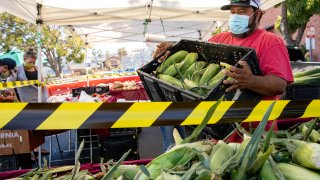
In March, Congress authorized a $19 billion bailout for farms suffering losses because of the coronavirus pandemic, and left the Department of Agriculture to work out how the money would be spent. When the program was rolled out two months later, Agriculture Secretary Sonny Perdue said its $16 billion in direct payments would be a "lifeline" for farmers of "all sizes and all…production."
But that's not what happened, according to an NBC News analysis of the first nearly 700,000 payments, totaling $5.6 billion, obtained through a public records request. The Coronavirus Food Assistance Program, while greatly appreciated by many farmers who spoke to NBC News, has been marked by structural challenges. The preliminary data suggests it has favored large, industrialized farms over smaller, diversified ones, provides loopholes for corporate farms, and has sent sizable payments to foreign-owned operations. Ultimately, many struggling farmers remain ineligible for assistance, unable to access any of Congress's funds.
The uneven distribution of funds is stark. The top one percent of recipients got more than 20 percent of the money, totaling $1.2 billion. The top 10 percent got over 60 percent of the pot, while the bottom 10 percent got just 0.26 percent. The top 10 percent of recipients got an average payment of almost $95,000, while the bottom 10 percent averaged around $300.
"I'm sure the money helped those larger operations tremendously," said Lonnie Sigler, an Alabama rancher and high school agriscience teacher. "But for a person like myself that sells once every six months, it's hard to see how it can help you all that much."

